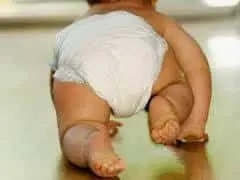You’re officially a parent when you’ve smelled your baby’s butt to see if they’ve pooped, and officially a smart parent if you’ve examined said poop before tossing it. Sound weird? What a baby puts out can tell you a whole lot about what’s going on inside if you know what to look for. Knowing what weird poop means can also relieve a lot of, “OMG My baby’s poop is purple!” freak-out episodes. I’m not saying to put your babies poop under a microscope, but just give it a quick look to note color and texture.
A first poop:
Your baby’s first poop will likely look the weirdest. This poop is called Meconium and is made up of amniotic fluid, dead skin cells, and bile. Considering its ingredients, its no wonder meconium poop looks sort of like black tar. It will pass within the first 24 hours. A baby that does not pass meconium needs to be seen by a doctor right away, this could indicate an intestinal blockage.
All the colors of the rainbow:
Normal Baby Poop:
Breast fed baby poop: Yellow to Mustard
Formula bottle baby poop: Yellow to Peanut
Babies that have begun solid food: Yellow to Brown
Green Baby Poop:
Possible meanings: too much iron (may be almost black), stomach bug, allergy, jaundice, or hind/fore milk imbalance in breast fed babies (switching breasts before baby has gotten to hind milk).
Normally green poop is nothing to worry about, if it persists for an extended amount of time, you should consult your pediatrician.
Black Baby Poop: (Other than in the first 24 hours of life)
Indicates digested or old blood in stole. See a doctor.
Red/Bloody Baby poop:
Bleeding towards the anus (hence it’s not black). See a doctor if excessive. A small amount of fresh blood accompanied by hard poop may just be some minor tearing from constipation.
White/Pale Baby Poop:
Could indicate liver problems. See a doctor if persists.
Orange/Purple/Etc. Baby Poop:
Eating carrots? Prunes? Baby poop will often take on the color of their food. In the case of odd colored poops not mentioned above, try feeding them something else today and see if it changes. If odd colored poop persists after dietary changes and time, consult a doctor.
Consistency Counts:
Seedy/Curdled Baby Poop: Regular in breast feed babies.
Creamy/Peanut Buttery Baby Poop: Regular in bottle fed babies or babies that have began other foods.
Chunky/Thick/Pellet-like Baby Poop: Could indicate constipation. Try a water bottle a day, it will ease bowel movements. This should also be done if urine is very pungent.
Mucus in Baby Poop (looks like boogers in the poop): Indicates stomach bug or virus. Watch for fever and other symptoms.
Watery/Extra runny Poop: Breast fed baby poop does tend to be a bit more liquid-like, but after awhile you’ll get the hang of how watery is too watery when it comes to poops. Too watery is diarrhea. Keep good fluids and electrolytes. See a doctor if it persists.
Some random baby poop information:
-Breast fed baby poop smells sweeter. Breast fed babies also suffer from diaper rash and constipation (breast milk is a laxative) less frequently, but will poop more than a formula fed baby.
-Fruits will cause baby poop to smell sweet as well, and are the worst food when it come to creating said diaper rash. For this reason you may want to hold off on them at first, and start slow like many other foods in the first year. Some of which are even dangerous.
-A baby that poops less often is not necessarily constipated, nor is chunky poop always an indication. It’s normal for bowel movements to slow down as a baby ages, and poop to change consistency as they start on solid foods. Normal varies from baby to baby. For instance, while a newborn may go several times a day, a six-month old may poop just once a day, if that. Grunting and/or turning red, again, is also not always a sign of constipation, some babies just do this.
-You’ll likely notice your baby’s digestive system is faster than yours, and what goes in comes out somewhat unchanged when it comes to solid foods.
So there you have it, whether you ever expected to be reading about it or not, you now know all about your baby’s poop. Welcome to parenthood.

